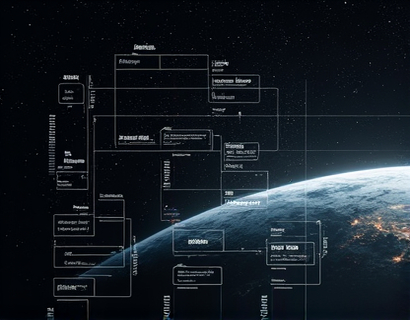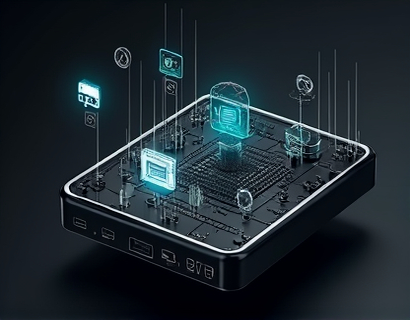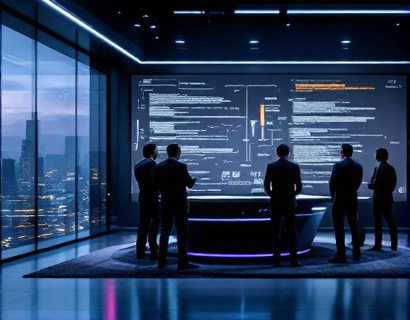Unlocking Growth in the Crypto and AI Frontier: A Guide to Digital Transformation
In the rapidly evolving landscape of technology, the convergence of blockchain and artificial intelligence (AI) stands out as a pivotal force driving innovation and transformation. This guide delves into the fusion of these two revolutionary technologies, offering essential insights for businesses and tech enthusiasts aiming to enhance engagement and drive growth in the digital age. By understanding the synergies between blockchain and AI, organizations can unlock new opportunities, streamline operations, and create more engaging experiences for their users.
The Intersection of Blockchain and AI
The integration of blockchain and AI represents a significant leap forward in digital technology. Blockchain, known for its decentralized and secure nature, provides a robust foundation for trust and transparency. AI, with its ability to process and analyze vast amounts of data, brings intelligence and automation to the table. Together, these technologies can create systems that are not only secure and transparent but also intelligent and efficient.
The fusion of blockchain and AI can be seen in various applications, from smart contracts that execute automatically based on predefined conditions to predictive maintenance in IoT devices powered by blockchain for data integrity. This synergy opens up a myriad of possibilities for businesses looking to stay ahead in a competitive market.
Enhancing Trust and Security
One of the most significant benefits of combining blockchain and AI is the enhancement of trust and security. Blockchain's immutable ledger ensures that data once recorded cannot be altered, providing a high level of security. AI can further bolster this by detecting anomalies and potential security threats in real-time. For instance, AI algorithms can monitor blockchain transactions and identify patterns that deviate from the norm, alerting systems to potential fraud or errors.
In the context of digital transformation, this enhanced trust and security are crucial. Businesses can leverage these technologies to build more reliable and secure systems, which in turn can foster greater customer confidence and loyalty. For example, in supply chain management, blockchain can track the origin and movement of goods, while AI can predict and prevent disruptions, ensuring a seamless and trustworthy process.
Improving Efficiency and Automation
AI's ability to automate repetitive and time-consuming tasks, combined with blockchain's smart contract capabilities, can significantly improve operational efficiency. Smart contracts on the blockchain can automate complex processes, such as payments, agreements, and compliance checks, without the need for intermediaries. AI can optimize these smart contracts by analyzing data to determine the most efficient execution paths and conditions.
In the realm of finance, for instance, AI-driven algorithms can analyze market data and execute trades through smart contracts on a blockchain, reducing latency and increasing the speed of transactions. This combination can lead to more efficient market operations, lower costs, and better service for users.
Personalization and Enhanced User Engagement
Personalization is key to user engagement in the digital age. AI's strength in data analysis and pattern recognition can be harnessed to create highly personalized experiences for users. By integrating AI with blockchain, businesses can ensure that personalization is not only effective but also secure and transparent. Blockchain can store user preferences and behavior data in a decentralized manner, giving users more control over their data while AI uses this data to tailor experiences.
For example, in content recommendation systems, AI can analyze user interactions and preferences, while blockchain ensures that the data used for personalization is secure and user-consented. This approach not only enhances user engagement but also builds trust, as users are more likely to engage with platforms that respect their privacy and data ownership.
Data Integrity and Transparency
Data integrity and transparency are critical in building trust and ensuring compliance in various industries. Blockchain's decentralized and immutable nature ensures that data is tamper-proof and transparent. AI can complement this by providing advanced analytics and insights into data patterns and trends. Together, these technologies can help businesses maintain high standards of data quality and transparency.
In industries such as healthcare, where data privacy and accuracy are paramount, the combination of blockchain and AI can ensure that patient data is securely stored and accurately analyzed. AI can process and analyze medical data to provide insights and recommendations, while blockchain ensures that this data is tamper-proof and accessible only to authorized parties.
Case Studies and Real-World Applications
Several organizations have already begun to leverage the power of blockchain and AI to drive growth and innovation. For instance, a leading insurance company implemented a blockchain-based claims processing system powered by AI to streamline the claims process. The AI algorithm analyzes claims data in real-time, while the blockchain ensures that all transactions are secure and transparent. This has resulted in faster claim processing, reduced fraud, and higher customer satisfaction.
In the supply chain sector, a major retailer used blockchain to track the provenance of products and AI to predict demand and optimize inventory. The blockchain provided an immutable record of the product's journey, while AI analyzed sales data to forecast future needs. This combination has led to more efficient inventory management and reduced waste.
Challenges and Considerations
While the potential benefits of combining blockchain and AI are significant, there are also challenges and considerations that businesses must address. One of the primary challenges is the technical complexity involved in integrating these technologies. Businesses need to invest in skilled personnel and robust infrastructure to ensure successful implementation.
Another consideration is the regulatory landscape. As blockchain and AI are relatively new technologies, regulations are still evolving. Businesses must stay informed about local and international regulations to ensure compliance. Additionally, there is a need for standardization to facilitate broader adoption and interoperability.
Privacy and data governance are also critical. While blockchain and AI can enhance data security, they also raise concerns about data ownership and usage. Businesses must implement robust data governance policies and ensure transparency in how user data is collected, stored, and used.
Strategies for Digital Transformation
To successfully integrate blockchain and AI into their digital strategies, businesses should follow a structured approach. Here are some key steps to consider:
- Assess Current Infrastructure:Evaluate your existing technology stack and identify areas where blockchain and AI can add value.
- Define Clear Objectives:Clearly define the goals and benefits you aim to achieve through this integration. Whether it's improving efficiency, enhancing security, or personalizing user experiences, having clear objectives will guide your implementation.
- Build a Skilled Team:Assemble a team with expertise in both blockchain and AI. This may involve hiring new talent or upskilling existing employees.
- Pilot Projects:Start with small-scale pilot projects to test the integration and identify potential issues. This approach allows for iterative improvements and reduces the risk of large-scale implementation failures.
- Monitor and Adapt:Continuously monitor the performance of your blockchain and AI systems and be prepared to adapt based on feedback and changing requirements.
By following these strategies, businesses can navigate the complexities of integrating blockchain and AI and unlock the full potential of these technologies.
Conclusion
The fusion of blockchain and AI represents a transformative force in the digital landscape. By enhancing trust and security, improving efficiency and automation, personalizing user experiences, and ensuring data integrity, businesses can drive significant growth and innovation. While the journey to digital transformation through this integration is challenging, the rewards are substantial. Embracing these technologies can position businesses at the forefront of the next digital revolution, enabling them to thrive in an increasingly competitive and connected world.










































